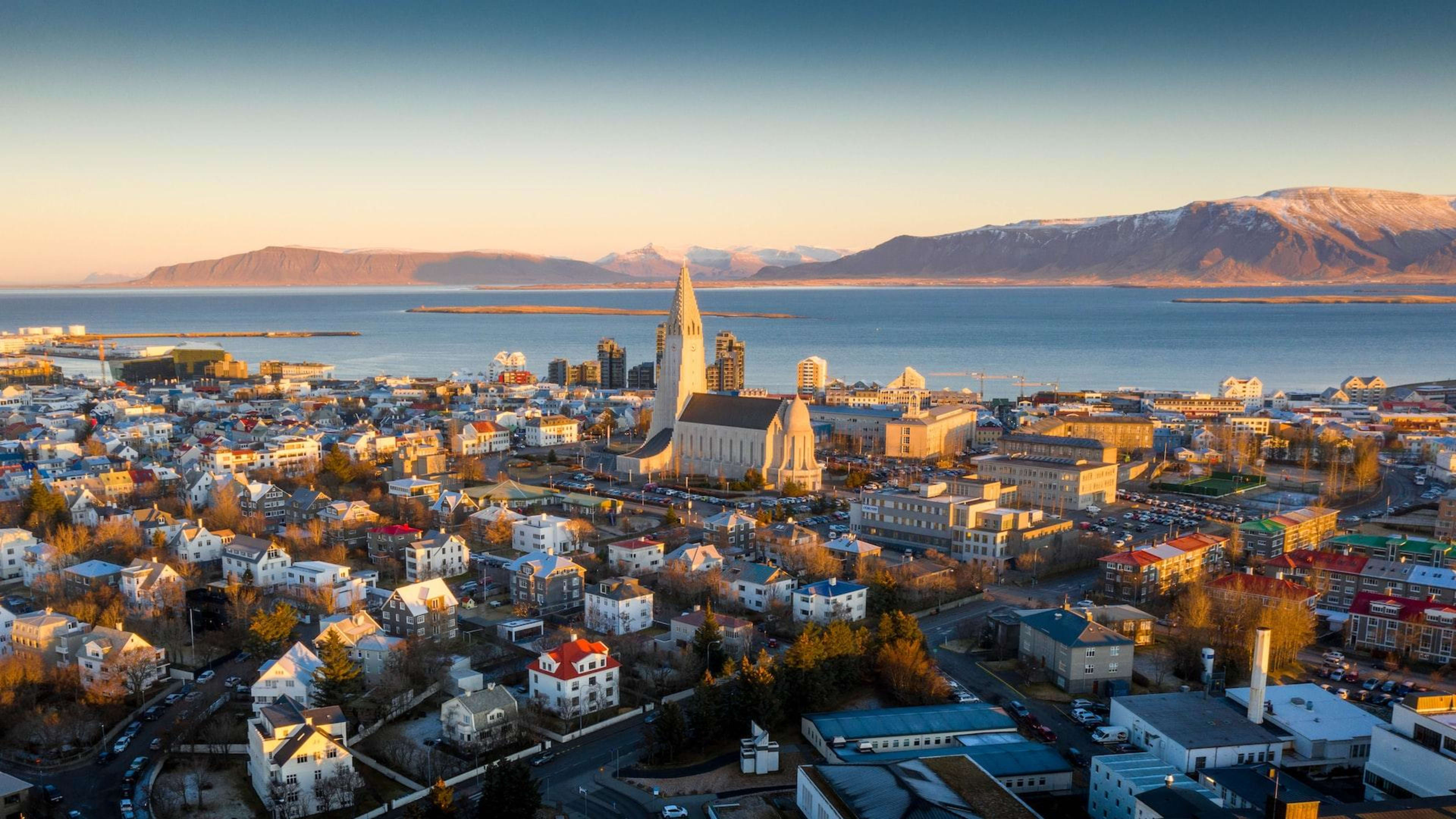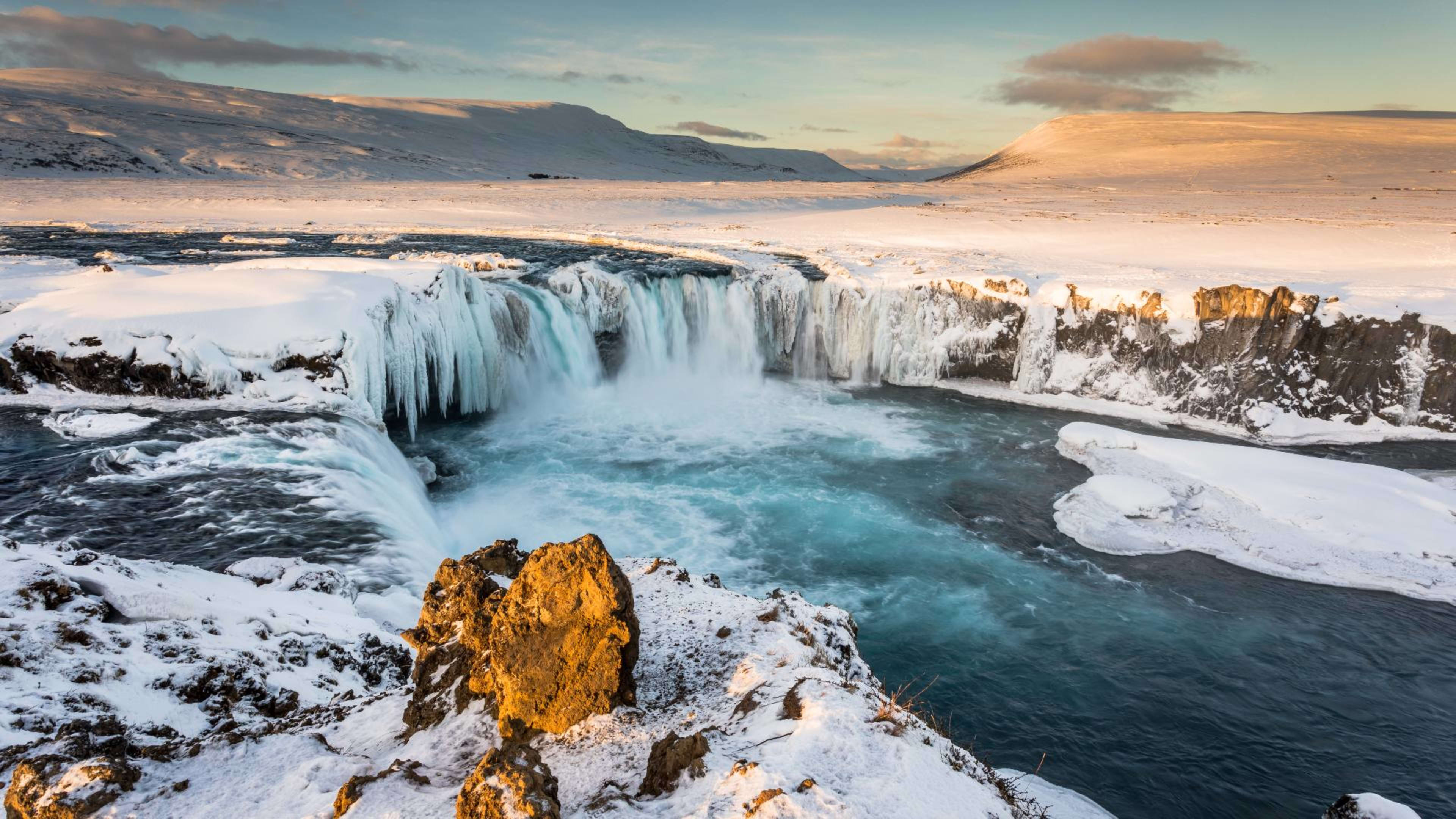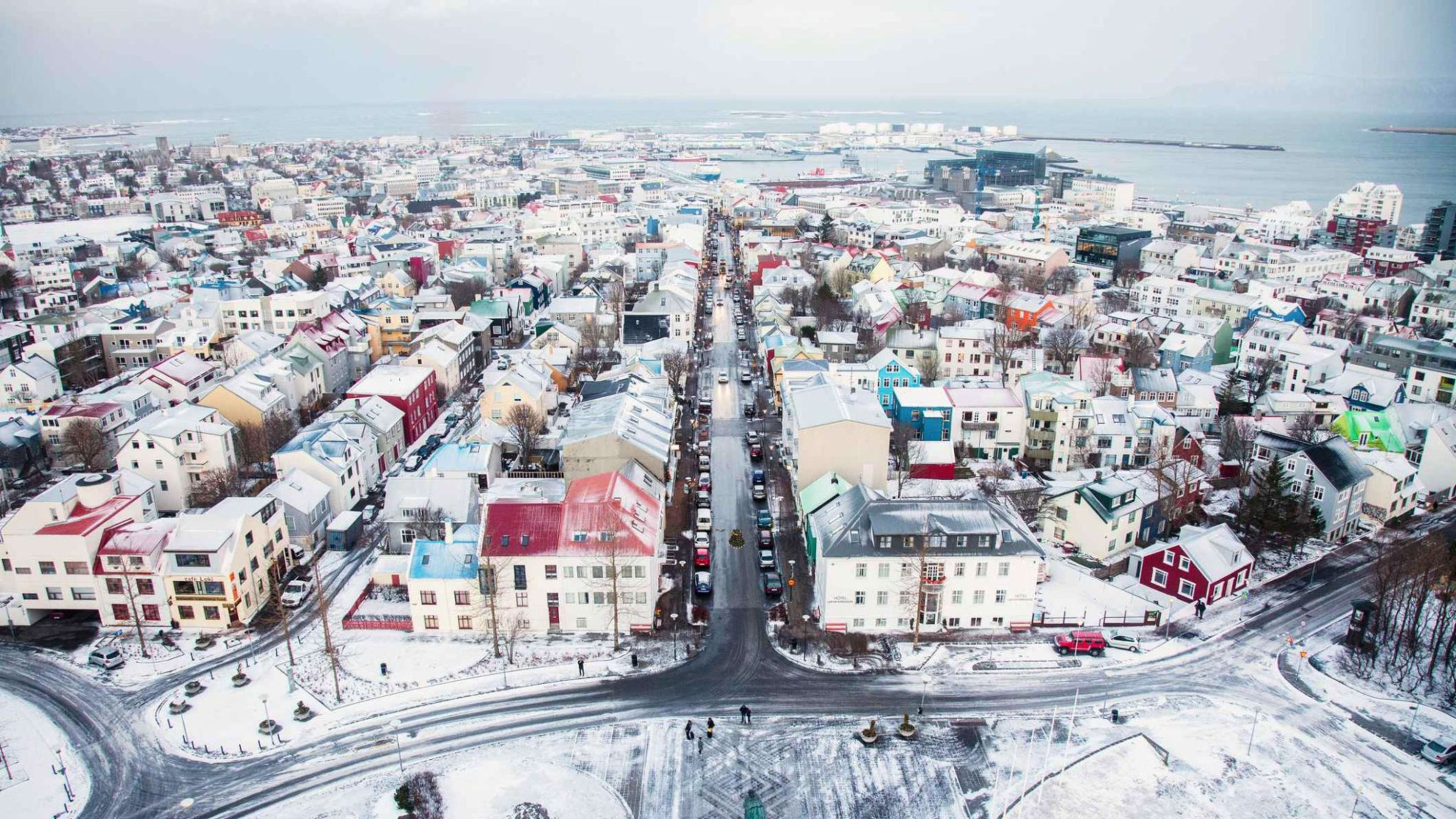The Land of Fire and Ice is best known for its spectacular nature, but towns and cities in Iceland also have a whole lot to offer. You could soak in a local pool with Icelanders, spend an afternoon museum hopping, or fuel up at a cozy café.
Travelers often ask about the best cities in Iceland, but technically there is only one place that earns the big city title: Reykjavík. Read on to get the lowdown on the must-see places and top experiences in the capital.
In this article, you’ll also find the best towns in Iceland to visit. Scattered around the countryside, each has its own unique vibe and attractions. Whether you’re looking for sleepy fishing villages or artsy towns, Iceland has it all.
- Explore Iceland’s capital and small towns on one these multi-day packages from Reykjavík.
Top 10 cities & towns in Iceland to visit
1. Reykjavík

The largest city in Iceland, Reykjavík, is also the country’s lively capital. Most people live here – in fact about two-thirds of the population call it home. Here you’ll find the center of Iceland’s cultural life, including:
- Fascinating museums and galleries packed full of history
- Diverse restaurants and food halls using Icelandic ingredients
- Delightful local swimming pools, a great alternative to the Blue Lagoon
- Buzzing bars with local beers and live music in the evenings
- Cozy cafés, great for afternoon coffee and a slice of cake
There’s so much to see and do that we decided to break it down by neighborhood. So let’s dive in!
Downtown

You’ll find the oldest part of the city around the streets of Austurstræti, Bankastræti, and the main shopping street Laugavegur. This is the area known as downtown Reykjavík or 101, after the postcode.
Laugavegur is packed full of restaurants featuring cuisine from Iceland and around the world, along with trendy bars and cafés. And you won’t want to miss stopping by the food hall at Hlemmur for a cheap(er) and tasty bite.
- Why not explore snowy Reykjavík on a winter trip to Iceland?
- See this Iceland Restaurant Guide for more on the best places to eat.
Just off Laugavegur are the quaint streets of the Þingholt neighborhood. Here you’ll find classic Icelandic timber-framed houses painted in bright colors. And at the top of the hill, you can’t miss the iconic Hallgrímskirkja church, which was for a long time the tallest building in Reykjavík.
The local pool in this part of town is Sundhöllin, found on Barónsstígur street. It’s the oldest in Reykjavík, opened in 1937, but was recently extended with a new outdoor area. Spend an evening relaxing in the ‘hot pots’ (what the locals call hot tubs) and getting to know the city’s residents.
You’ll spot countless museums and art galleries in downtown Reykjavík, including the Settlement Exhibition, Icelandic Phallological Museum, and Reykjavík Art Museum.
Grandi
The peninsula of Grandi near the old harbor is also known as the Fishpacking District. Historically where fisherman would dock their boats, today it’s home to trendy restaurants and cultural venues.
You can take a wander down the main street, Grandagarður, with its parade of cool eateries (including a legendary ice cream shop). There’s also a food hall with tasty options and a great view over to Harpa and the harbor.
This is also where you’ll find the Icelandic Maritime Museum. Here you can learn about Iceland’s seafaring history and see the Óðinn coastguard ship. Further down Grandagarður is the Marshall building, home to Nýlistasafnið, a contemporary art museum.
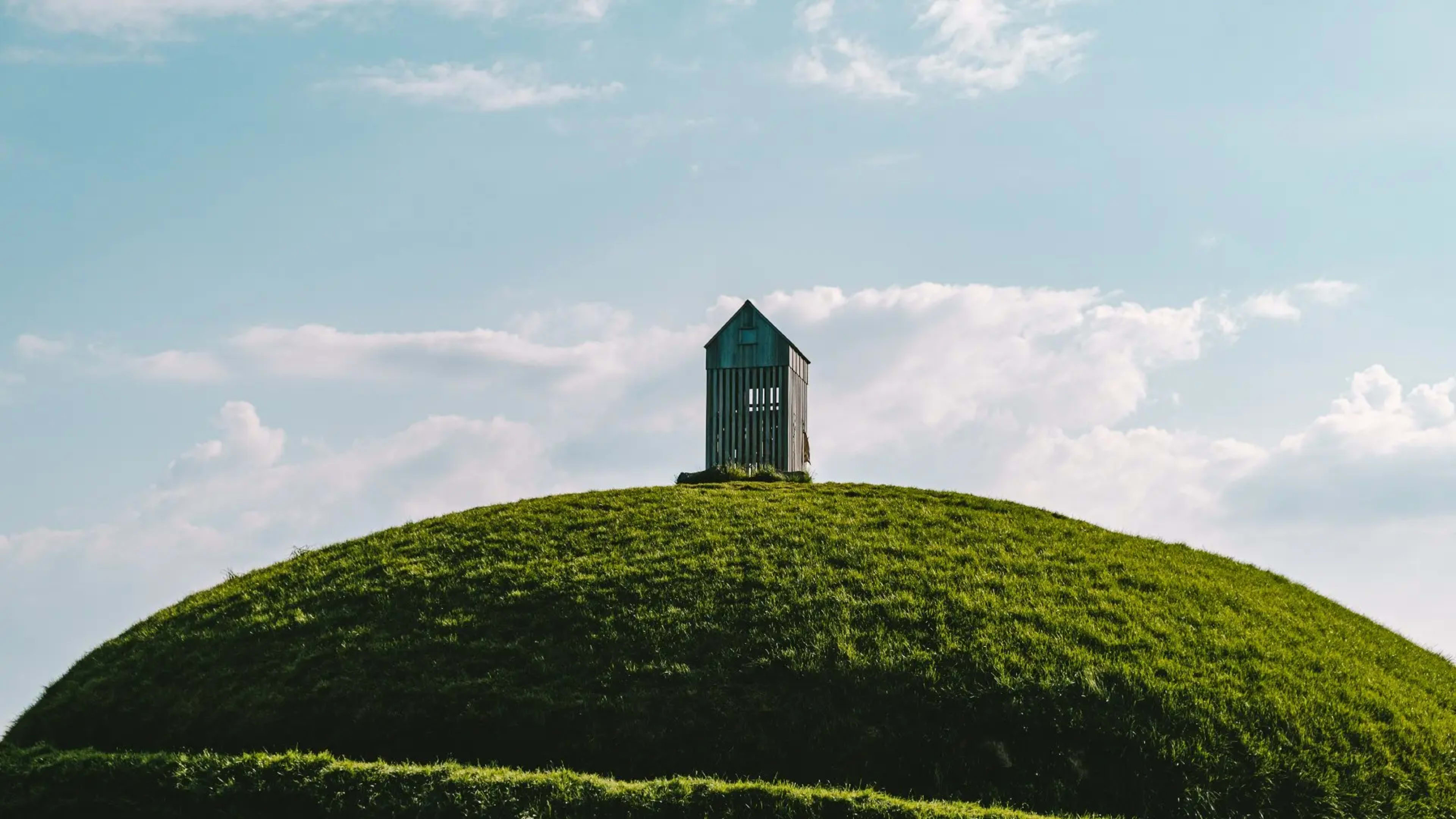
At the very end of this peninsula is Þúfan, a permanent artwork inspired by the grass tussocks found all over the Icelandic countryside. Walk to the top, where you’ll get a fantastic view of the city and the Esja mountain across the bay.
Vesturbær
The western part of the city is split into two parts either side of the Hringbraut road. On the north side, you’ll find more classic timber-framed houses with cute gardens. You might even spot one of Reykjavík’s many cats!
On the south side, you’ll find the Vesturbæjarlaug swimming pool. This has a massive outdoor hot pot and a relaxed vibe, perfect for chewing the fat at the end of a long day.
There’s also a few cafés and restaurants scattered about the neighborhood, along with another legendary local ice cream shop.
- Find out how you can minimize your impact on the local environment with this guide to sustainable travel in Iceland.
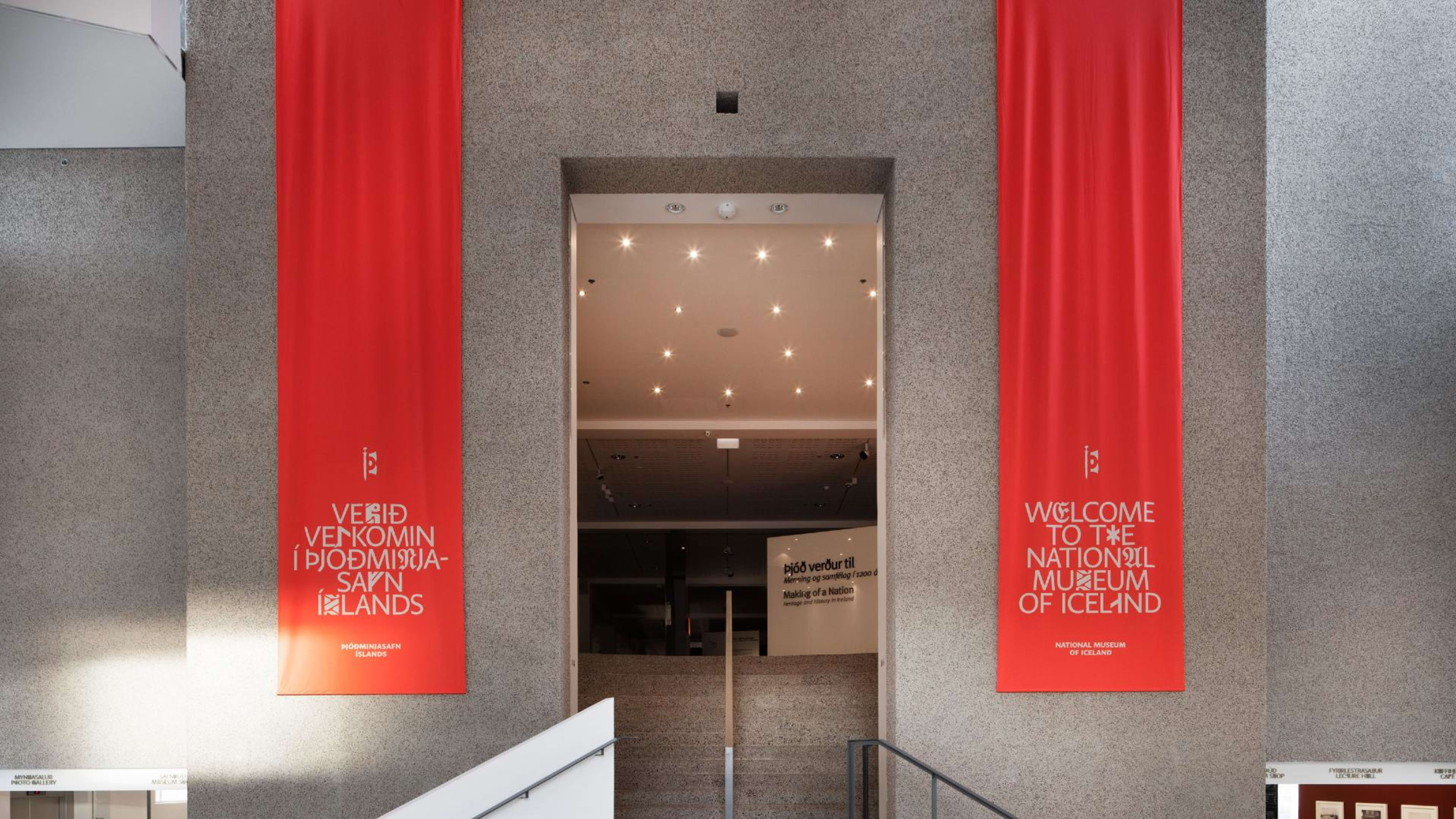
This area of town is also home to the National Museum of Iceland, Þjóðminjasafnið. Here you’ll learn about Iceland’s history, from the arrival of the Vikings in the 8th century right up to the present day. It’s also a great place to pick up a locally made souvenir.
Laugardalur

You’ll find the Laugardalur valley just to the east of the city center. This leafy neighborhood surrounds a large park, which is home to Reykjavík’s zoo and botanic gardens. In the gardens is a wonderful greenhouse café filled with exotic plants.
On a sunny summer’s afternoon, you can enjoy a stroll through the park and end up at the Laugardalslaug pool. Soak in hot pots, including one with seawater, or swim lengths in the Olympic-sized pool. It also has a slide, so along with the zoo, it’s great for kids!
Near Laugardalur is the terminal for a ferry that takes you over to the island of Viðey, which is packed with birdlife in the summer. It’s a great place to take a stroll and get a different view over the city. In the winter, the Imagine Peace Tower is lit every year on the island as a symbol of world peace.
- Related: Top things to do in Reykjavík.
2. Akureyri
The town of Akureyri is the capital of North Iceland and the largest settlement in the country outside of the capital area. You might be surprised to find that Akureyri is often warmer and less windy than Reykjavík thanks to its location in a sheltered fjord.
You can enjoy this pleasant weather at the botanical gardens, which include a collection of Arctic plants and a café in a forest.
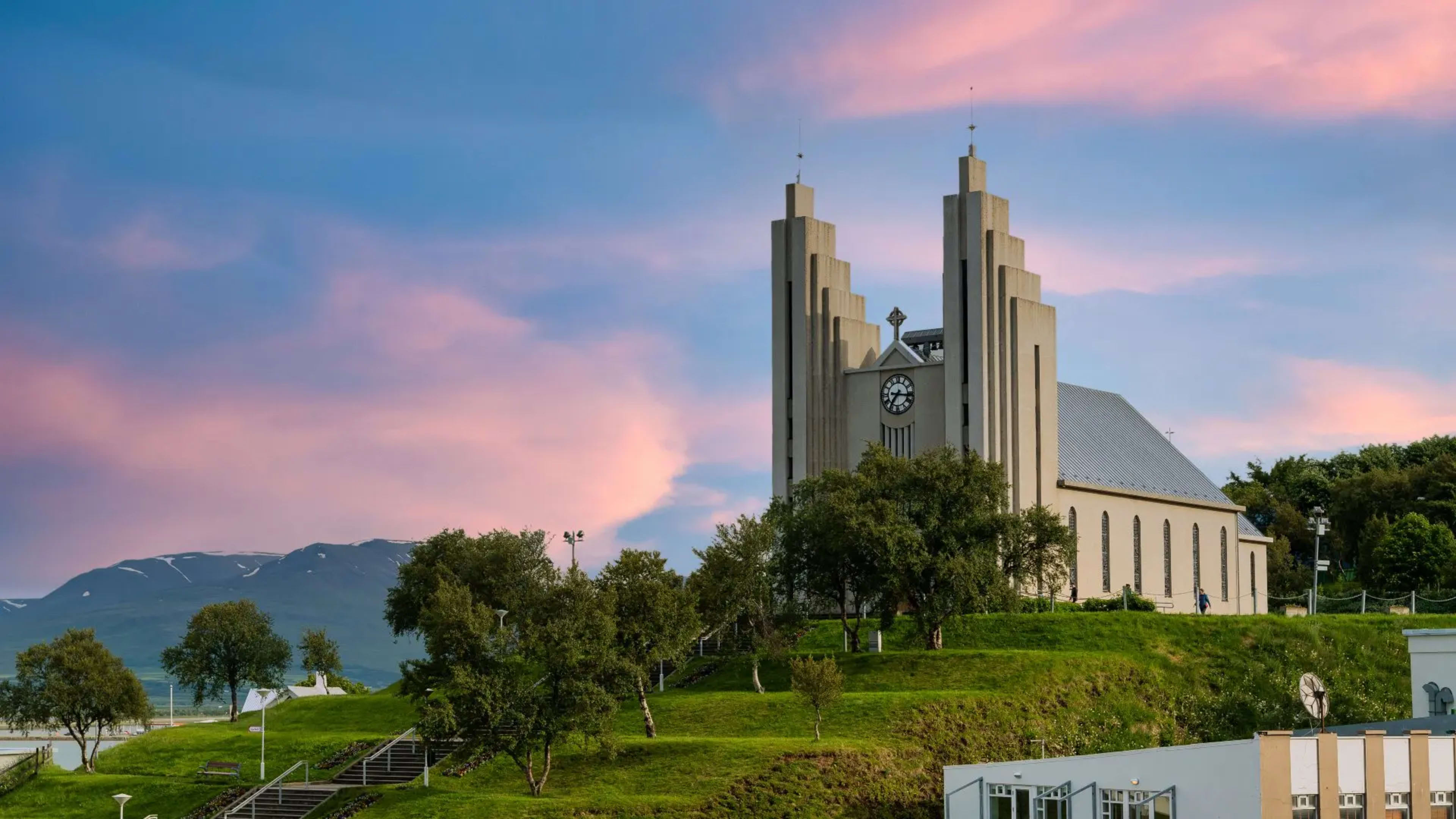
One building you won’t miss is the church, Akureyrarkirkja, designed by famed Icelandic architect Guðjón Samúelsson (who also conceived Reykjavík’s Hallgrímskirkja). To get to it, you need to climb a ‘stairway to heaven’ from the town center, but it’s well worth it for the view.
Down in the town center itself, you’ll find restaurants and cafés clustered around the main street of Hafnarstræti. A short walk from here are the Hof culture house, which hosts various events throughout the year, and Akureyri Art Museum.
Even if you’ve never been to Iceland, you might well have come across Einstök beer which is sold around the world. It’s brewed right here in Akureyri, and you can taste it for yourself at the Einstök Brewer’s Lounge in the town center.
Akureyri makes a handy base for trips into the countryside of northern Iceland. It’s just over 1 hour’s drive from Lake Mývatn, with its unusual geological formations and hot springs.
- Explore Akureyri and the Mývatn area on a North Iceland & Akureyri tour.
- Related: Top things to do in Akureyri.
3. Hveragerði & Selfoss
Well technically this is two towns, but they’re both in South Iceland and only a short drive from each other along the Ring Road.
Hveragerði is a charming small town filled with heated greenhouses growing flowers and vegetables. The town is in a very geothermally active area, which you will see if you stop by the town’s hot spring park.

To the north side of the town is the walking route to the Reykjadalur valley. Here you can bathe in a naturally warm river, surrounded by Icelandic nature!
- Warm up at Reykjadalur on an Iceland winter self-drive tour.
- Related: Your guide to hot springs and geothermal pools in Iceland.
Selfoss is located further south and is one of the larger settlements in Iceland. It’s home to an ‘old’ town center that features reconstructions of buildings formerly found all over Iceland. The centerpiece is the Mjólkurbú dairy building (below).
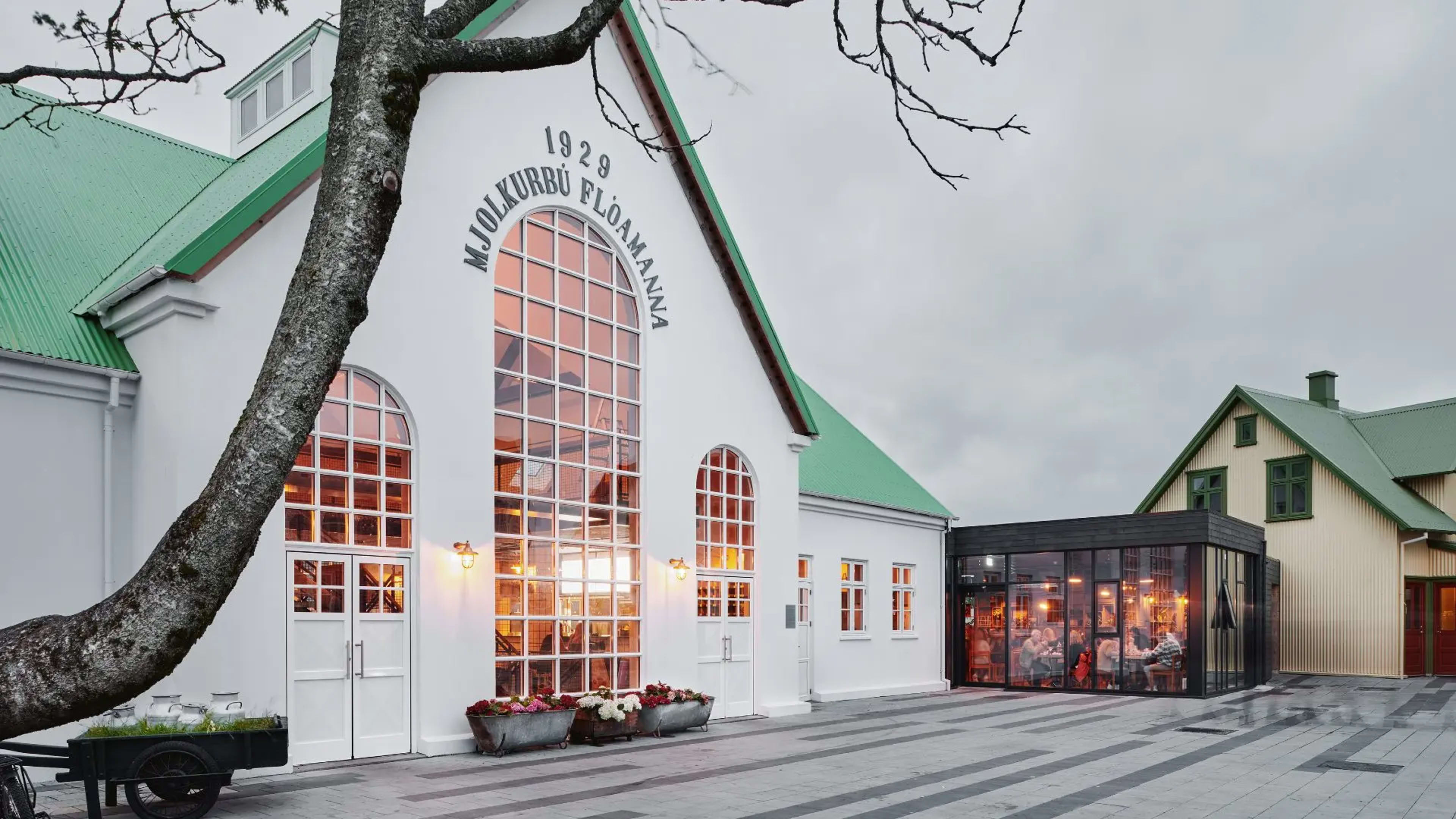
These days you’ll find a food hall where you can grab a bite. And in the basement there’s an exhibit about skyr, Iceland’s famous yogurt-like dairy product.
As you drive between Hveragerði and Selfoss, you’ll almost certainly notice endless fields of horses on your way. This region of Iceland is ideal for horseback riding, so if you’re interested then get in touch with a local firm.
4. Stykkishólmur
The fishing village of Stykkishólmur is the largest settlement on the Snæfellsnes peninsula in West Iceland and a great place to stop if you’re exploring the area. In fact, Snæfellsjökull National Park – with its very own glacier – is just a short drive away.
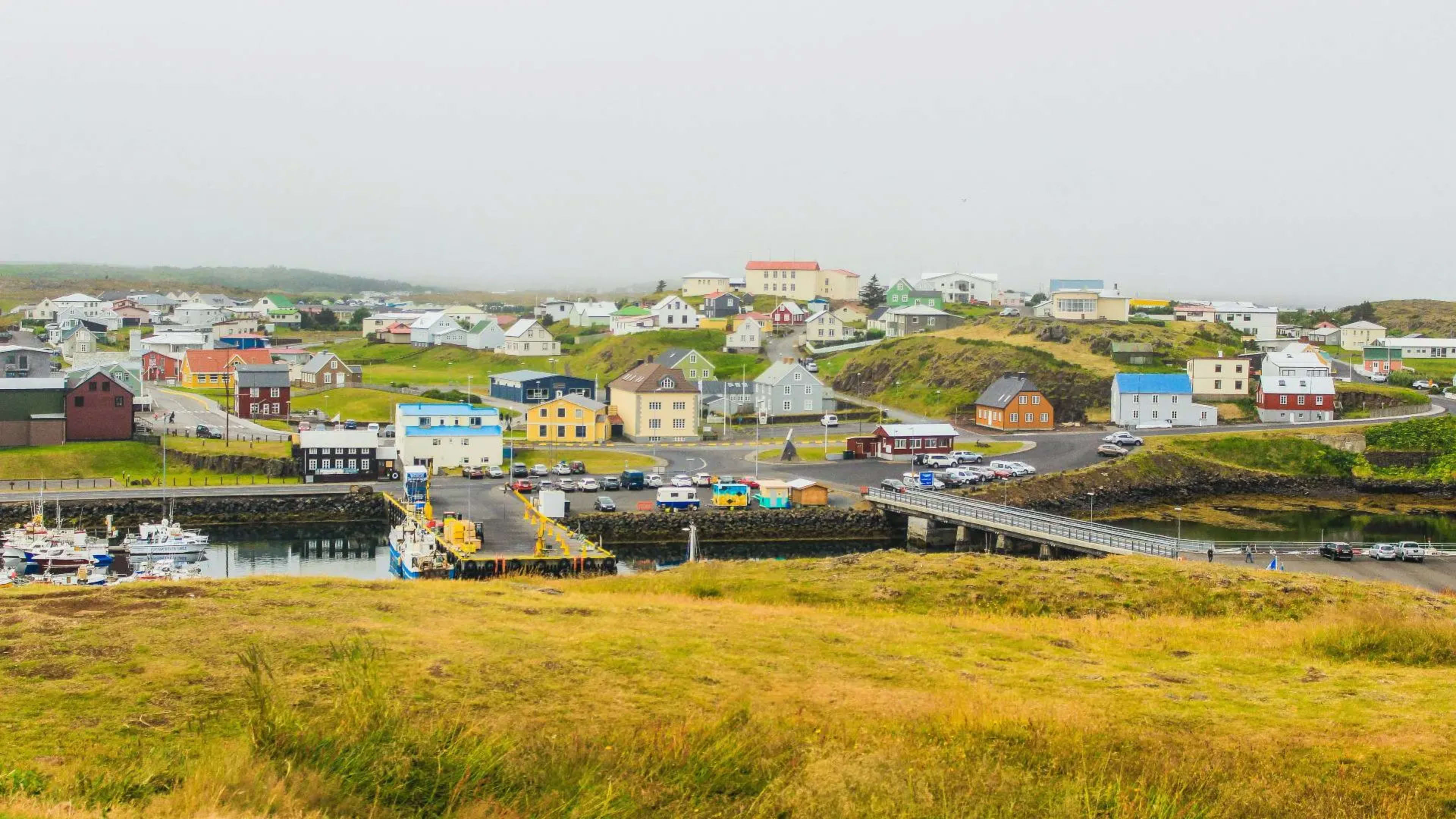
Clustered around the old harbor, you’ll find a handful of quaint restaurants offering top-quality local seafood. On the other side of the harbor is the Súgandisey cliff, where you can take in breathtaking views over Breiðafjörður bay.
- Explore the whole Snæfellsnes peninsula on a privately guided tour.
The bay itself is home to dozens of different bird species, including eider ducks. For hundreds of years, Icelanders have collected the duck’s feathers for use in pillows and duvets. At the Eider Center in Stykkishólmur, you can learn all about this traditional local industry.
You’ll find various boat tours operating from the harbor, including bird watching tours in the bay. There are also ferry connections to the island of Flatey, a popular escape for many Icelanders in the summer, and the Westfjords. Speaking of which…
5. Ísafjörður

By far the largest settlement in Iceland’s Westfjords, Ísafjörður seems like a metropolis in comparison to its neighboring villages. Nestled on a small peninsula in a dramatic fjord, this historic trading post is well worth checking out.
Its quaint streets are lined with traditional Icelandic timber-framed buildings, clad in corrugated steel and painted in bright colors.
- Delve into the Westfjords on a summer vacation to Iceland.
Step back in time as you learn about the area’s history at the Museum of Everyday Life, where local voices and memories have been curated into a thought-provoking exhibition. The Westfjords Heritage Museum is another great place to visit and discover more about the region’s maritime history.
The town is also home to a surprisingly diverse range of restaurants, so it’s ideal for an evening meal after a day of exploring.
Ísafjörður is a hub for boat trips around the Westfjords. From here, you can sail to the remote Hornstrandir region, now a haven for Arctic foxes after being abandoned in the 20th century. You could also join a whale or bird watching tour from the town’s harbor.
6. Borgarnes
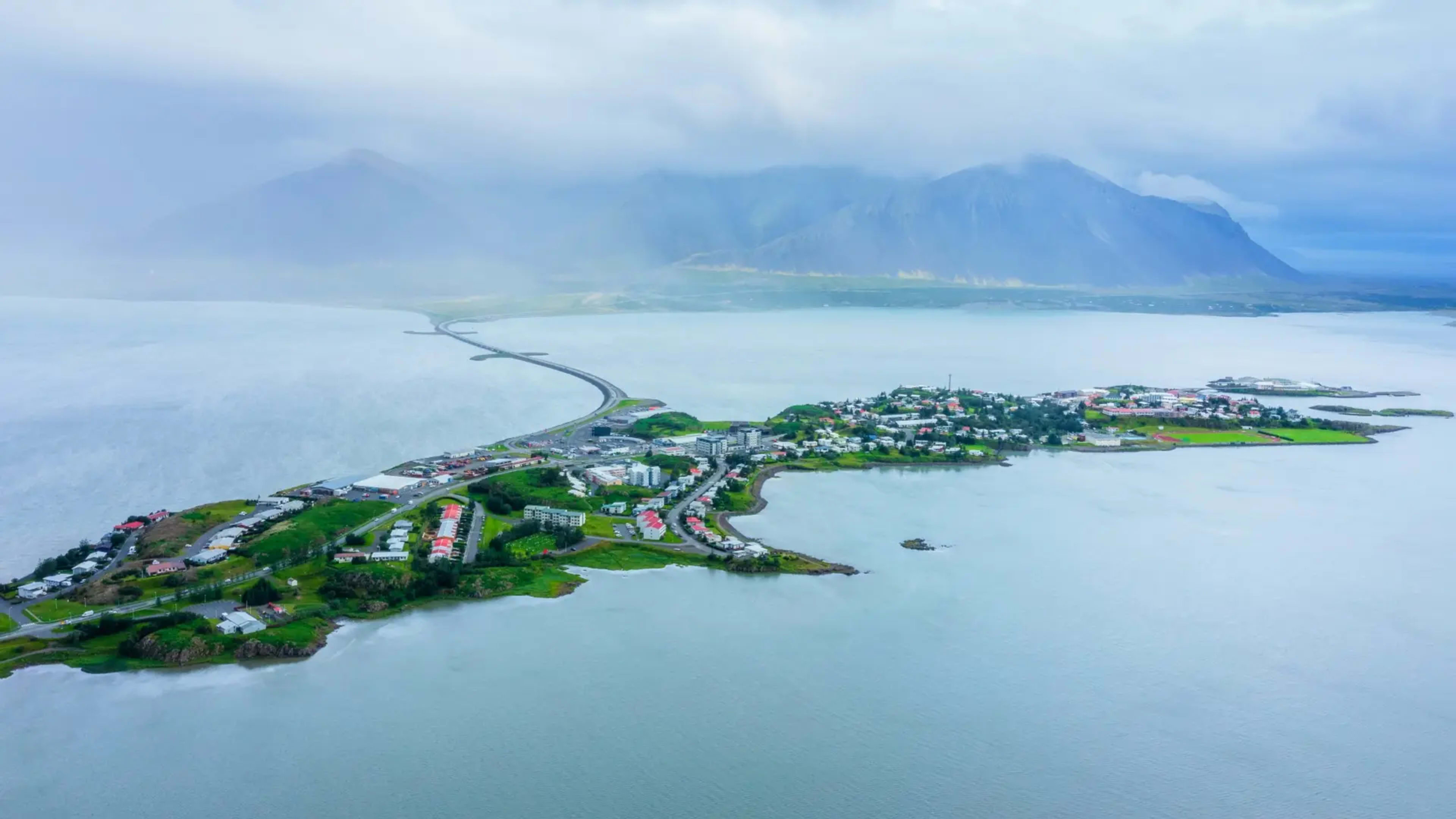
Although the town of Borgarnes was founded in the 19th century, it can trace its history all the way back to the settlement of Iceland in the 8th century. This makes it one of the oldest towns in Iceland.
Skalla-Grímr, a Norwegian who was one of the first settlers, had his farm in the area. You can still visit it today at Borg á Mýrum just to the north of the town. Hike up the small hill behind the farm and you’ll be rewarded with panoramic fjord views.
- Explore the area around Borgarnes on a 7-day trip around Iceland.
Fun fact: in the settlement period, the rule was that men could claim as much land as they could see from a high point in the land. So everything within view from the hill at Borg á Mýrum would have belonged to Skalla-Grímr!
Afterwards, drop by the Settlement Center museum in Borgarnes to uncover more stories about the country’s earliest inhabitants. You can also stop for coffee and cake at one of the town’s cozy cafés.
7. Seyðisfjörður
The colorful small town of Seyðisfjörður in East Iceland is an unexpected haven for artists and musicians. Tucked away in a small fjord, the town is worth visiting just for the stunning drive from the Ring Road around hairpin bends.

Seyðisfjörður has a remarkable collection of well preserved Icelandic architecture. You’ll notice the artistic influence in the town through the bright colors and murals painted on the buildings. Chief among them is the blue church, at the end of a street painted in rainbow colors.
In the summer, Seyðisfjörður hosts LungA art festival, which attracts artists and art fans alike from across the world. Visit at this time of year and you could take part in its program of exhibitions, concerts, workshops, and other events.
- Read all about Iceland’s people and culture.
- Check out more cultural events and festivals in Iceland.
Some of the most interesting restaurants in East Iceland can be found in Seyðisfjörður, so it makes a good afternoon or evening detour. Plus, Seyðisfjörður makes for an easy addition to your Ring Road trip. Just divert off Route 1 (the Ring Road) and follow the 93 road for around 30 minutes to reach the town.
8. Húsavík
The fishing village of Húsavík has shot to fame in recent years as the setting for the film Eurovision Song Contest: The Story of Fire Saga. The filmmakers even created an ode to the village, which has become a karaoke favorite in Iceland.

But Húsavík also has another, more exciting, claim to fame: it’s the whale watching capital of Iceland. The waters off its coast are rich with different species, including minke whales, fin whales, and pilot whales.
- Check out this guide to the best whale watching in Iceland.
You can learn more about these incredible beasts at Húsavík Whale Museum, which is home to 11 whale skeletons. Visit the Maritime Exhibition at the Culture House afterwards if you want to explore the area’s seafaring history in even more depth.
Húsavík is one of the more remote villages in Iceland, yet it’s only a 1-hour drive from Akureyri. You’ll fall in love with its quaint timber church and seaside charm.
9. Vestmannaeyjabær
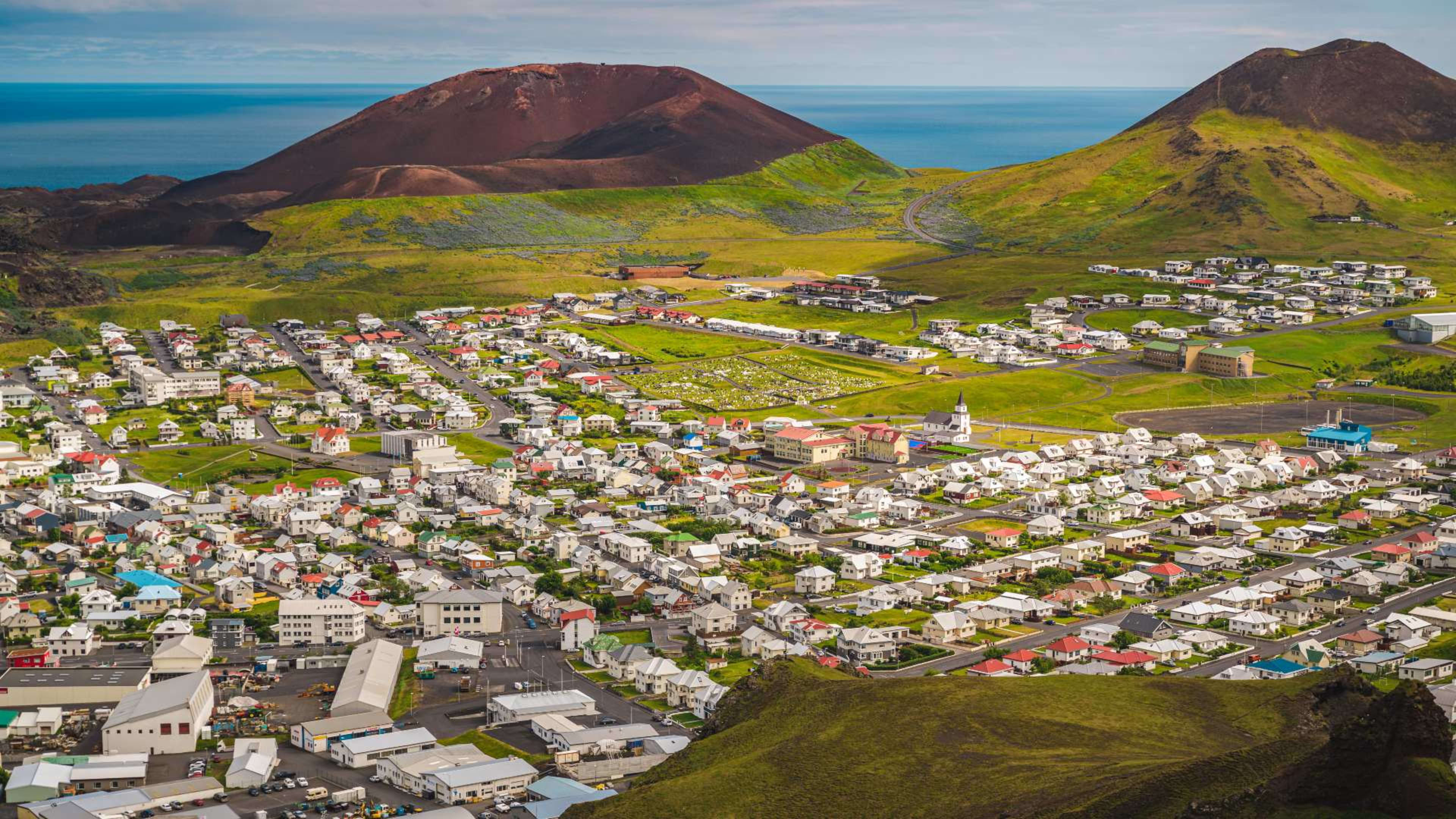
The town of Vestmannaeyjabær is the only settlement in the Westman Islands, a small group of islands off the south coast. The town, which you’ll find on the largest island of Heimaey, has a fascinating backstory.
Historically important due to their location near rich fishing grounds, the Westman Islands were ravaged by a volcanic eruption in 1973. Lava began spreading across Heimaey and made its way towards the town, which was partly swallowed up.
Thanks to the heroic efforts of local fisherman, all the islanders made it safely away. You can learn all about the eruption and see an excavated house at the Eldheimar museum. Today the dormant volcano still looms in the distance.
Because of its compact layout, Vestmannaeyjabær feels different to many other towns in Iceland. As you sail into the harbor, with puffins and other seabirds gliding above, you might well feel like you’ve arrived in the Faroe Islands.
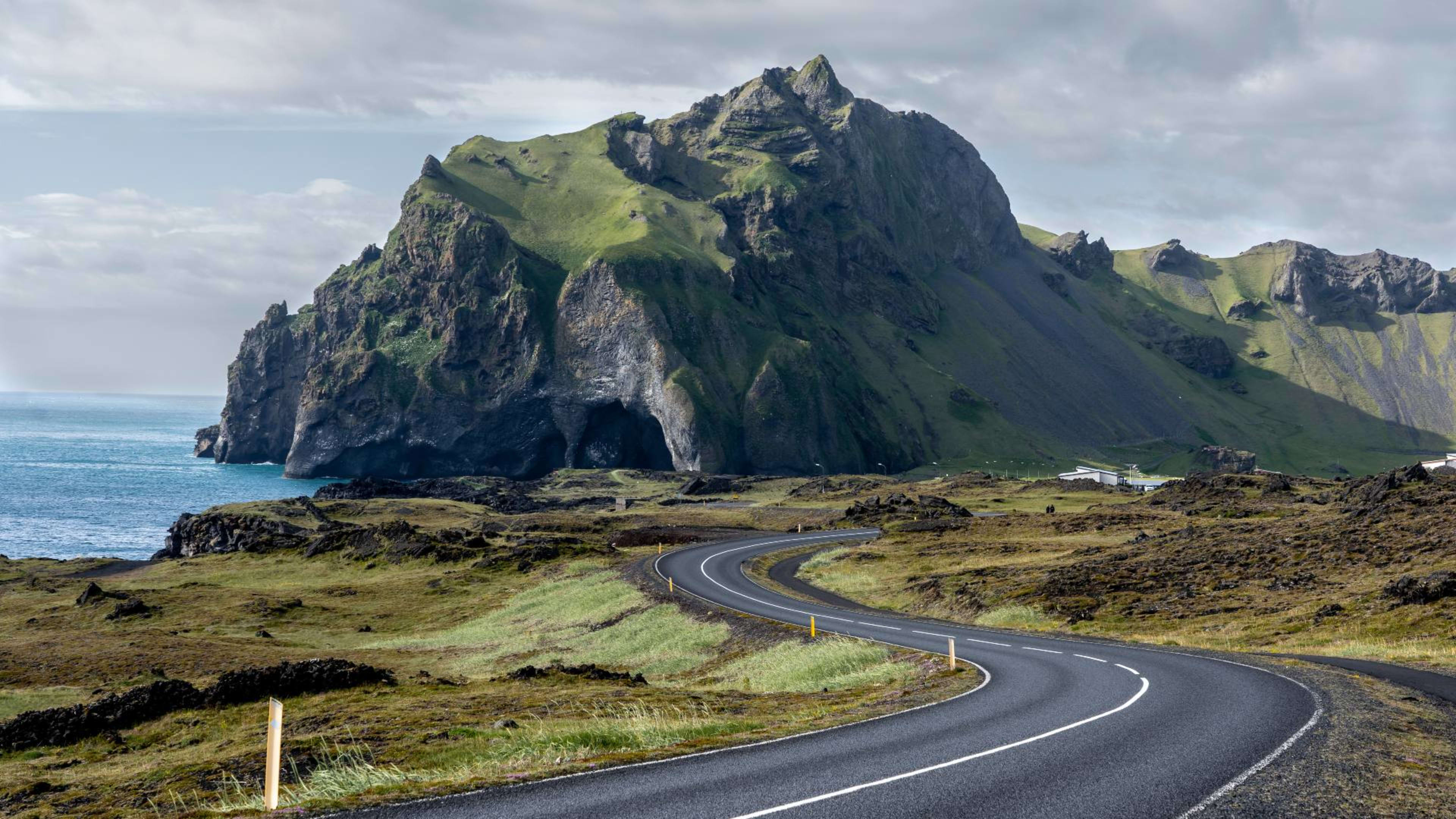
In summer, it’s easy to spot nesting puffins along the cliffs on the west side of town, near the golf course. Here you’ll also find Elephant Rock, a cliff named after its resemblance to the giant land mammal.
- Read all about the best places to spot puffins in Iceland.
The Westman Islands are doable in a day, with multiple ferry sailings a day from Landeyjahöfn harbor on the mainland. You can easily get to Landeyjahöfn from Route 1, just turn right near Seljalandsfoss waterfall.
10. Vík
Surrounded by black sand beaches, Vík í Mýrdal is a must-see stop when you’re traveling along Iceland’s south coast. It sits not far from the southernmost point on the Icelandic mainland.
A stone’s throw from the town you’ll find Reynisfjara black sand beach. In fact it’s just on the other side of the mountain to the west of the village. Read this guide to Reynisfjara for the lowdown on this legendary beach.
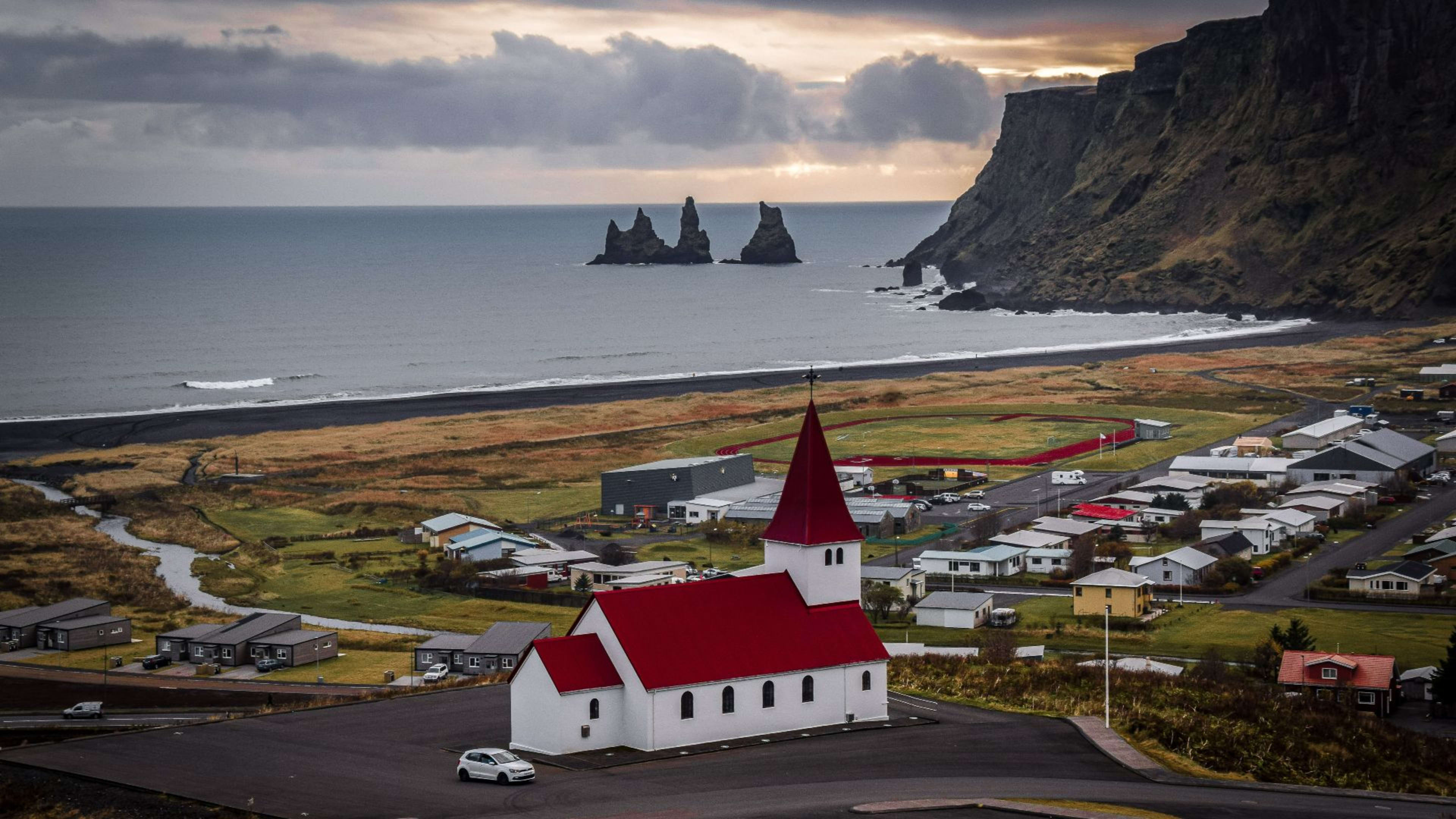
You can see the famous Reynisdrangar sea stacks from Vík, as well as from Reynisfjara itself. For the best view, head up to Víkurkirkja church. This viewpoint overlooks the whole town, including the beach.
Vík is home to restaurants, including one with a microbrewery. You’ll also find a knitting studio and another great local pool.
If you’re on a camping trip, there is a large campsite in Vík with good facilities. It’s also just across the road from the local supermarket.
How to see Iceland’s towns and cities
There are plenty of different ways to travel between Iceland’s towns and villages. If you want the freedom to explore them all, then a self-drive tour is the answer. In your own rental car, you can go when you want, where you want.
A multi-day tour from Reykjavík will allow you to explore the towns of South Iceland, West Iceland, and the Snæfellsnes peninsula. And because you’ll be traveling by bus, you can skip the driving.
With a package from Iceland Tours, you get accommodation, local transport, and a detailed itinerary included. What’s more, you can lock in your booking with just a 5% deposit.
So what’s stopping you? Start planning your urban adventure in Iceland today!

